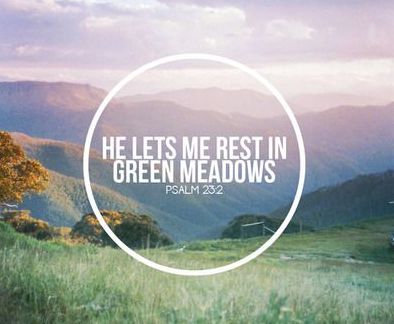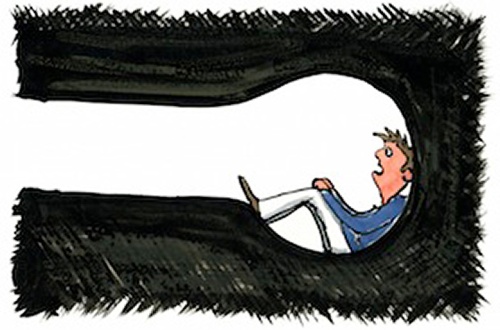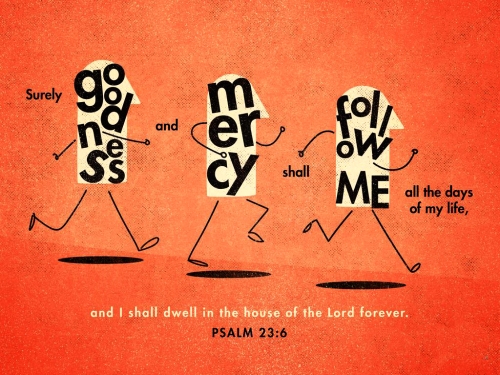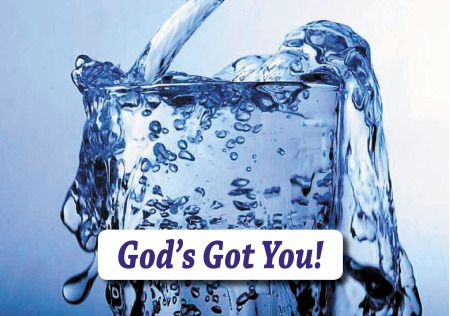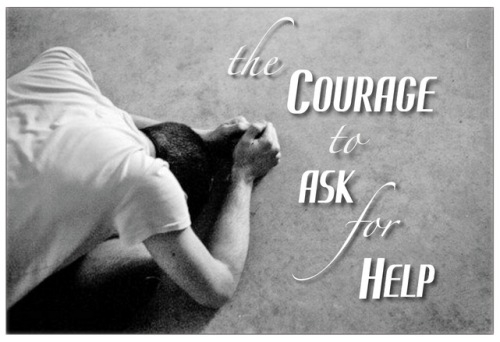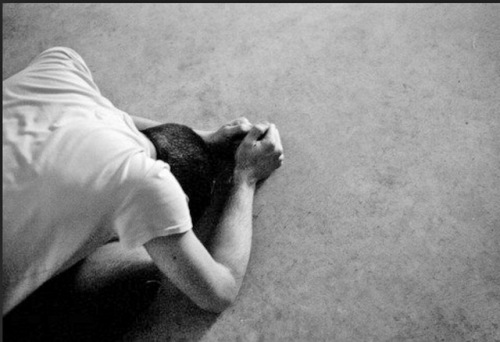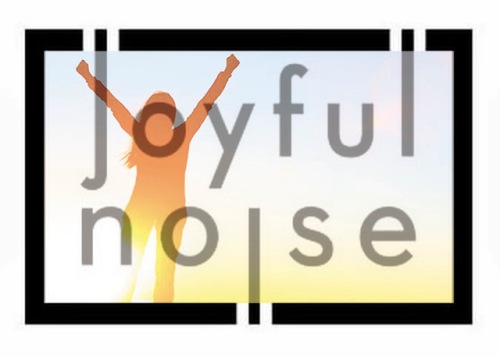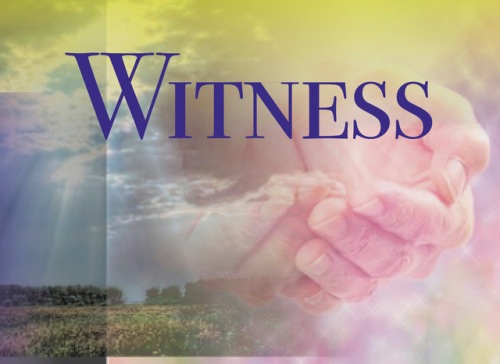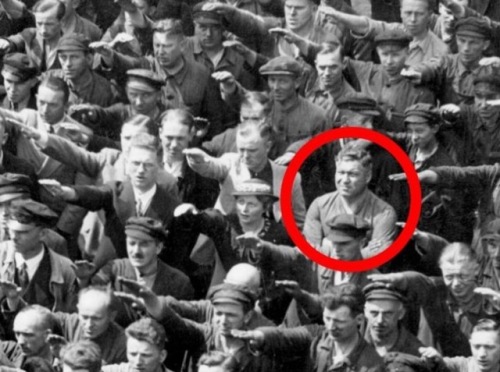For 59 days there have been Black Lives Matters protests outside the justice center and federal courthouse in downtown Portland– the city of my dreams, the city I’m blessed to finally call home. There have been protests elsewhere in the city too, but every night a solid group of protesters has assembled outside these criminal justice centers to call attention to the great brokenness of our justice system, to the militarization of police and policing, to the particular vulnerability of black, indigenous, and people of color and to demand change, meaningful structural change– disinvestment in forms of policing that too often profile people of color and end up with a disproportionate number of people of color behind bars or dead. This is, of course, nothing new. But the video of the knee on George Floyd’s neck, the news of Ahmaud Arbery and Breonna Taylor… these three high profile cases came to consciousness in the midst of a pandemic and people rose up and filled the streets.
On Juneteenth (June 19th), I joined a clergy vigil, in daylight. Prayed with colleagues. Shared a song. On that day I was invited to come back at 9 p.m. to bear witness to what happens when the sun goes down. I declined because of a very full day the next day, truly. But also out of fear.
I had the sense that the vast majority of protesters were peaceful. I was hearing that some however were righteously angry and willfully destructive. And I was hearing that the police were responding with great aggression. My colleagues were bravely showing up to be able to tell the story about what is really going on. I wasn’t ready. It felt too messy. Too complex. And… there’s this highly contagious virus circulating…
I was told by those who were participating in the protests regularly that the police were using massive quantities of tear gas to disperse the crowds and behaving in brutal ways. This seemed highly problematic given that the protests were triggered by the abuse of police power… to respond with aggressive power… drove more protests. An unending cycle.
Our state legislature met in special masked session and passed a number of police reform bills in very short order. Not enough, but progress. And it seems the protests began to wane.
Among the reforms was a ban of the use of tear gas, CS gas and all derivatives thereof (which had been used, repeatedly, against protesters), and prohibits sonic weapons (which police had used on June 5th against protesters). This ban was amended by lawmakers to allow tear gas to be used in situations police declare to be “riots.” And, it seems, riots have frequently been declared. Regardless, federal agents, with legal right to protect federal property and not bound by Oregon state laws, were deployed to our city. And my friends who have been bearing witness (and many journalists) have reported about the extreme aggression of these federal agents, with shocking accounts of peaceful protesters hit with non-lethal munitions, protesters grabbed and taken away in unmarked vehicles without ever being charged, and even a retired naval officer ending up with a broken hand when he tried to engage the agents in conversation. And so much gas, intense military grade gas, flooding the streets (just a few streets) night after night. And as the aggression of the feds ramped up, the crowds began to swell again.
After listening to the frustrated reflections of a colleague, I was convicted that it was high time for me to go and bear witness myself. I ordered a clerical shirt and collar, for the first time in 18 years of ministry…
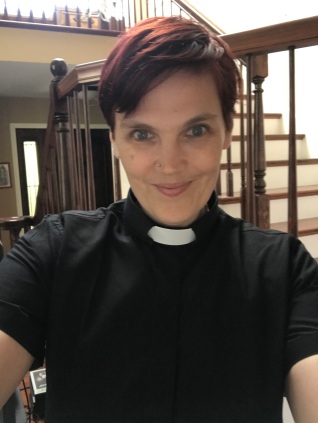
… and accepted an invitation to join two faithful colleagues who have been out many nights already on Friday night, July 24, day 59, from 9:30 pm to 1 am.
It was strange to be in such a large crowd after months of being mostly homebound. My friends told me the crowd was much larger than the night before. The crowd was almost entirely masked… and otherwise protected… bike helmets, gas masks, homemade shields, goggles. And really it was amazing– amazing to see so many people willing to stand up for the value of black lives, so many white people in this exceedingly white city, being led in chants by black leaders. I had heard on other nights that the crowd was mostly young folks, but on this night I saw people of all ages, and all walks of life, including a man in a business suit holding a “Lawyers for Black Lives” sign. And the signs… so many excellent signs. My favorite read just “Expelliarmus.” If only we could disarm others with a spell… (that “Shoot Less, Smile More” sign also made me grin.)
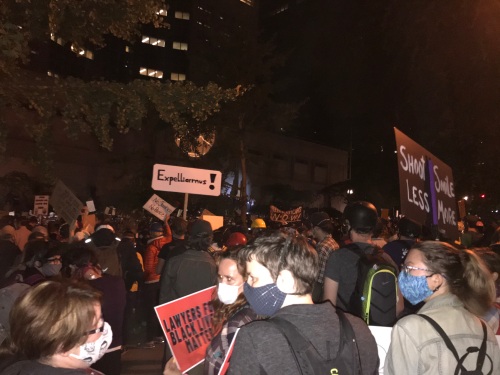
There were food tents set up and volunteers hard at work cooking for the crowd. Word was that this volunteer initiative has received so many financial donations they’ve asked for them to stop– they have way more than they need. My friend dropped off two bottles of hand sanitizer to them which they gratefully received.
And there were so many signs of people looking out for each other, taking care of each other. Volunteer medics at the ready. And people picking up trash.
The street right in front of the justice center and courthouse were packed with wall to wall people. Fencing had been put up in front of the federal building and we could see folks trying to pull this fencing down. I briefly caught sight of the now famous wall of moms, now moms and dads (see the handholding folks in yellow wearing bike helmets), worming their way through the crowd, but never got into this thick crowd myself.
We were seated near this action, talking with folks a bit. Several were very grateful to see clergy among the crowds. One talked with me about being there with the moms and taking in massive amounts of gas on previous nights. She said she felt safer now that the crowd was larger.
Eventually we pulled back, as the use of tear gas began. We were never directly in the gas, but my nose was running and I was coughing and sneezing a lot. So I definitely inhaled some of it. We stood by our car, which was parked amidst several volunteer medic vehicles and on the road where protesters typically had been pushed back on previous nights. We anticipated a press of protesters heading our way but it didn’t happen before we left around 1 a.m. We did witness some coming for medical help and many rushing to help the impacted and wounded.
It was a bit confusing, from our more distant spot, when law enforcement deployed gas that was accompanied by an explosive sound. But some protesters were also setting off fireworks, which truthfully felt exceedingly dangerous to me. I was grateful to be back away. It was hard to distinguish between explosive sounds. But there were some sounds that were easy to make out– some chants– Whose lives matter? Black lives matter. Say his name! George Floyd. Some chants I found distasteful and won’t repeat, but most were along these lines. And there were drums and trumpeters. I also was hearing rumors– of white nationalist groups circulating amidst the crowd and 40-50 officers approaching across the river on riot wagons.
That’s what I was hearing, but what was I seeing? Dancing, signs, people helping people, an artist painting the scene…
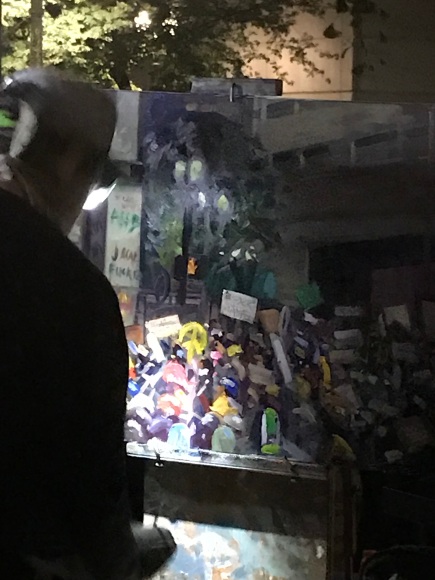
…people shaking the fence, leaning on the fence, fireworks…
What I wasn’t seeing? Evidence of white nationalist presence. Officers approaching on riot wagons. Federal agents. A riot. Truly, nothing seemed riotous. I was a bit troubled by the fence shaking and quite troubled by the fireworks, but I saw no violence or active property destruction on the part of protesters. One colleague saw one water bottle thrown over the fence. My colleague suggested that the behavior that seemed ill advised to me– trying to pull the fence down, setting off fire works– were acts of agitation, understandable expressions of anger. The goal of the protests is to achieve dramatic structural change until it is clear public officials are unwilling to tolerate the regular abuse and killing of people of color in our city, state, and country– and are willing to make the changes that will make that less likely. And vandalizing the buildings where injustice unfolds and trying to get direct access to these buildings is a physical way to represent the change that is sought. These are not tactics I appreciate, but I think I better understand them now.
I heard a protester exclaiming that if all the crowd could unite and speak in one voice that that would be more effective than, in his language, “poking the bear.” I tend to agree with him. I don’t think that a large crowd shouting in unison is unlikely to be greeted any less aggressively or violently, but I think then it is crystal clear who is using the force, and who is crossing the line. I believe in the power of large scale, non-violent protest to truly change things, even if it means bearing violence that arises in reactive response. A Facebook friend asked why the protests can’t move away from these buildings to stop provoking the nightly conflict. I think because, again, these are the most centralized symbols of the system that needs changing. And because it is from these buildings that nightly a continued militaristic response is emerging. That which is being protested is being reenacted night after night, drawing more people out to protest every night. I was not the only one there for the first time on day 59.
I understand the federal agents emerged around 2:30 a.m. Perhaps some violence unfolded on the part of at least one protester. And one protester was arrested. I did not witness any of this directly.
What I did witness was thousands of people exercising their First Amendment rights, standing up for black lives, willingly enduring gas (sometimes using leaf blowers to blow it back) and taking other risks to demand necessary change.
And I’ll be back. Because change has got to come. And I want to keep bearing witness. And showing up with love. Even if it means looking right ridiculous… 


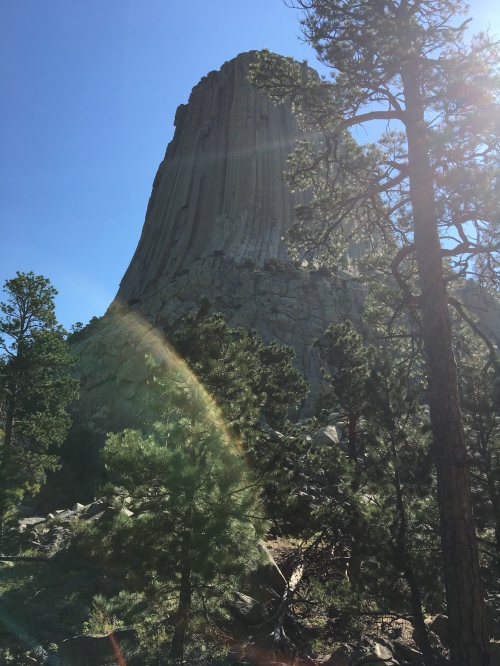
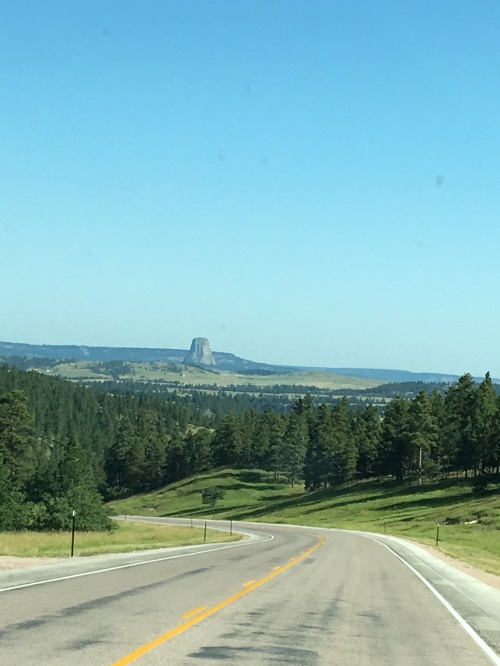
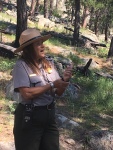
 So I translated what I heard into something that made sense. 500 million years ago these tallest columns in the world sprung up in the depths of the earth. Over the course of millions of years the years the ground around it eroded away to reveal it.
So I translated what I heard into something that made sense. 500 million years ago these tallest columns in the world sprung up in the depths of the earth. Over the course of millions of years the years the ground around it eroded away to reveal it.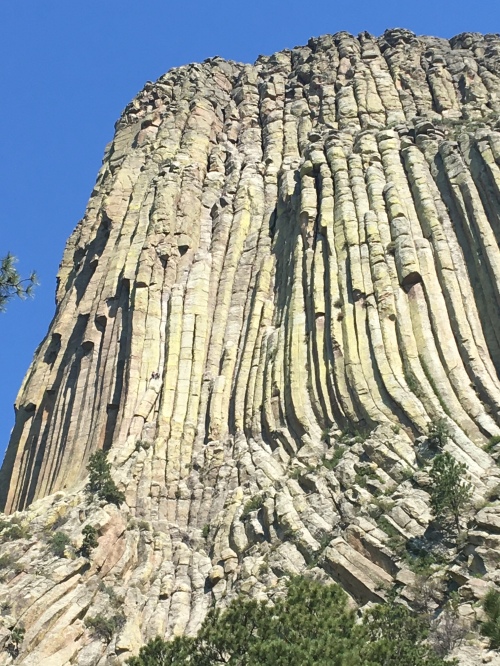
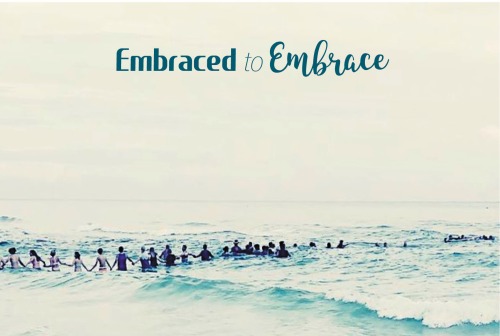
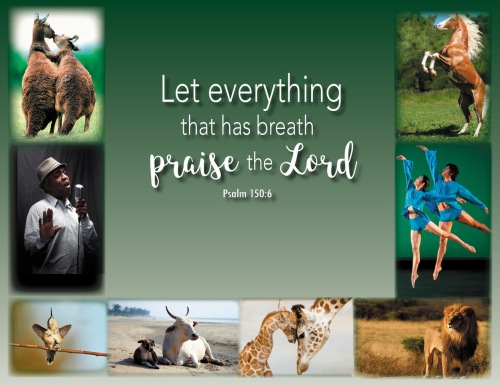
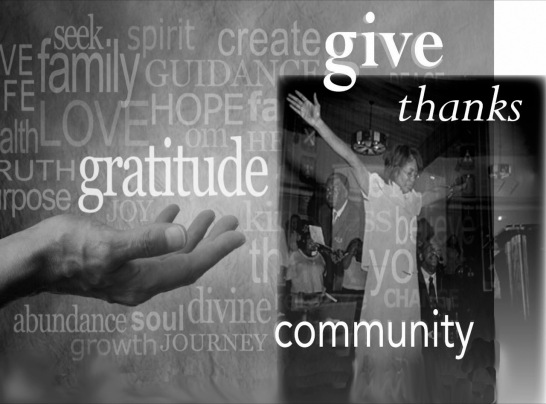
 When I was a child, I had a few neuroses. At a very early age I insisted that the seam on my socks or tights had to line up precisely with the tips of my toes. When this worked out, the day got off to a great start. However, it could be a very rough morning if this precision could not be attained. By early elementary school I had this thing for glue bottles sealed shut from years of careless use. I would spend hours carefully cleaning out the tips of glue bottles in the Sunday School classrooms of our church, finding a very particular satisfaction when glue flowed steadily from the tip once more and a very particular frustration when this success eluded me. You’d think that a little girl with such a bizarre hankering for order and precision would have been the queen of manners. But here we come to a third neurosis. I think I was a fairly polite kid, but by early to mid-elementary school I had this hang-up when it came to saying thank you.I’m sure I must have said it reflexively now and again, but there were certain moments when I knew that a thank you was in order and I would fret and sweat and feel terribly awkward and usually fail to say anything at all. I’m thinking of riding in the back seat of a friend’s car. Her mom is driving, the mom who made us special treats for our slumber party, the mom who let us giggle to all hours, the mom who cleaned up our messes. I knew that when we pulled in our driveway all I needed to do was say “Thank you”, grab my sleeping bag and backpack and run into my house. But the minute we pulled out of their driveway I started worrying about it. “What if I don’t say it right? What if I say it at the wrong time? What if I sound stupid? What if…?” The next thing I know, we’re in my driveway, I grab my stuff and say “Bye” as fast as I can and run inside feeling horrible for my neglect.
When I was a child, I had a few neuroses. At a very early age I insisted that the seam on my socks or tights had to line up precisely with the tips of my toes. When this worked out, the day got off to a great start. However, it could be a very rough morning if this precision could not be attained. By early elementary school I had this thing for glue bottles sealed shut from years of careless use. I would spend hours carefully cleaning out the tips of glue bottles in the Sunday School classrooms of our church, finding a very particular satisfaction when glue flowed steadily from the tip once more and a very particular frustration when this success eluded me. You’d think that a little girl with such a bizarre hankering for order and precision would have been the queen of manners. But here we come to a third neurosis. I think I was a fairly polite kid, but by early to mid-elementary school I had this hang-up when it came to saying thank you.I’m sure I must have said it reflexively now and again, but there were certain moments when I knew that a thank you was in order and I would fret and sweat and feel terribly awkward and usually fail to say anything at all. I’m thinking of riding in the back seat of a friend’s car. Her mom is driving, the mom who made us special treats for our slumber party, the mom who let us giggle to all hours, the mom who cleaned up our messes. I knew that when we pulled in our driveway all I needed to do was say “Thank you”, grab my sleeping bag and backpack and run into my house. But the minute we pulled out of their driveway I started worrying about it. “What if I don’t say it right? What if I say it at the wrong time? What if I sound stupid? What if…?” The next thing I know, we’re in my driveway, I grab my stuff and say “Bye” as fast as I can and run inside feeling horrible for my neglect. The same people who were talking freely, making eye contact with me, laughing and cajoling only a moment before get really quiet, look anywhere but at me, and they crinkle their brows letting worry and fear take over their faces. Sometimes someone volunteers or I volunteer someone and always the prayers are fine, usually even beautiful, sometimes deeply moving. But the anxiety in the room in this pre-prayer moment is terribly awkward, it feels a lot like what was going on inside of me as I sat in the backseat of a friend’s car.
The same people who were talking freely, making eye contact with me, laughing and cajoling only a moment before get really quiet, look anywhere but at me, and they crinkle their brows letting worry and fear take over their faces. Sometimes someone volunteers or I volunteer someone and always the prayers are fine, usually even beautiful, sometimes deeply moving. But the anxiety in the room in this pre-prayer moment is terribly awkward, it feels a lot like what was going on inside of me as I sat in the backseat of a friend’s car.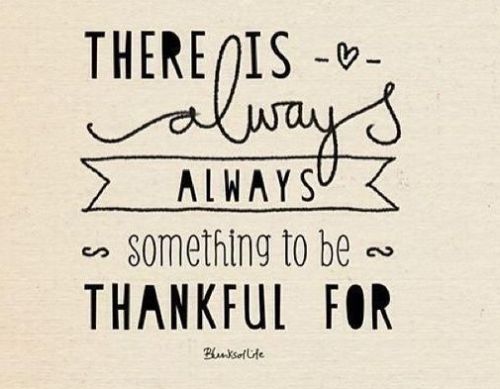
 Someone is feeling that his cries for help have gone unheard. Someone is feeling that no one, not even God, loves her. Someone is feeling that all is lost, there’s no cause for hope. Even when we gather for worship on a Sunday someone, or several someones in the gathered faithful may be teetering on the edge of despair, may be feeling that they’re stranded in the Arctic and gratitude is somewhere in the South Pacific. Even when you or I are in that place of despair, that place where “Thank You” is not in our vocabulary, it is still the case that we are God’s beloved children and there is cause for thanksgiving, but when we are in this thankless place we need those in the community who are right inside their gratitude to speak it out loud to remind us of the love of God that seems so far away from us. When you have cried out for help and you feel that the Lord has heard your cry, it is not enough to whisper “thank you” as you drift off to sleep though that is a good thing to do. You need to say “thank you” loud enough at least for your brothers and sisters in Christ in this family of faith to hear.
Someone is feeling that his cries for help have gone unheard. Someone is feeling that no one, not even God, loves her. Someone is feeling that all is lost, there’s no cause for hope. Even when we gather for worship on a Sunday someone, or several someones in the gathered faithful may be teetering on the edge of despair, may be feeling that they’re stranded in the Arctic and gratitude is somewhere in the South Pacific. Even when you or I are in that place of despair, that place where “Thank You” is not in our vocabulary, it is still the case that we are God’s beloved children and there is cause for thanksgiving, but when we are in this thankless place we need those in the community who are right inside their gratitude to speak it out loud to remind us of the love of God that seems so far away from us. When you have cried out for help and you feel that the Lord has heard your cry, it is not enough to whisper “thank you” as you drift off to sleep though that is a good thing to do. You need to say “thank you” loud enough at least for your brothers and sisters in Christ in this family of faith to hear.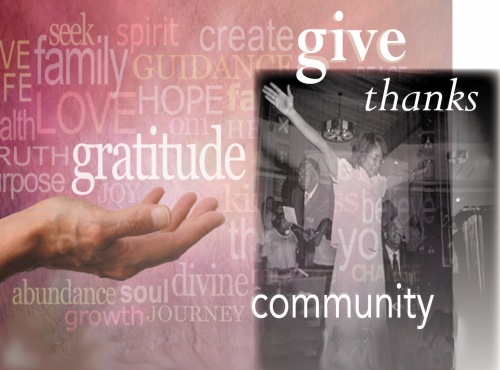
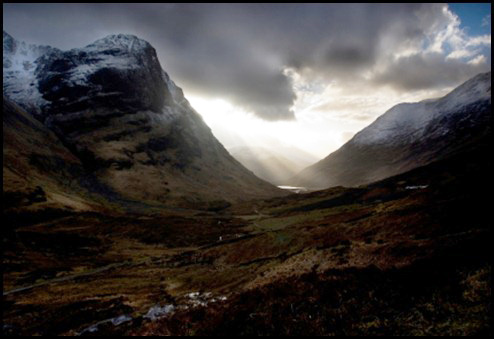
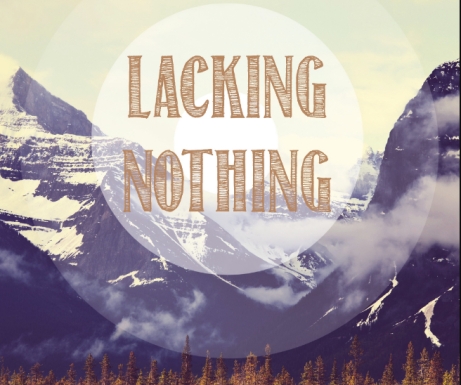 You and I know that verse better as “I shall not want.” But “I lack nothing” speaks more plainly I think. “I lack NOTHING.” How often do we hear that? How often do we feel that? I wrote this sermon surrounded by stuff that hasn’t yet found appropriate places in my more than adequate home, in my beautiful neighborhood, in this awesome city… and I’m convinced by the Ikea catalog that I lack… plenty. We are all bombarded with messages that we lack… plenty. I think in the church, the mainline church of the 21
You and I know that verse better as “I shall not want.” But “I lack nothing” speaks more plainly I think. “I lack NOTHING.” How often do we hear that? How often do we feel that? I wrote this sermon surrounded by stuff that hasn’t yet found appropriate places in my more than adequate home, in my beautiful neighborhood, in this awesome city… and I’m convinced by the Ikea catalog that I lack… plenty. We are all bombarded with messages that we lack… plenty. I think in the church, the mainline church of the 21